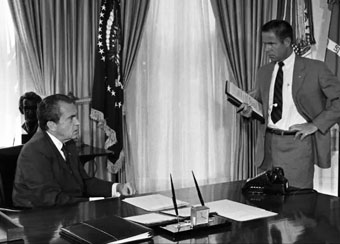Smoking Gun
The recording that proved Richard Nixon had obstructed justice

This is the transcript that proved President Richard M. Nixon guilty of obstruction of justice. For more than a year the President had told the American people that he had done nothing to interfere with the FBI investigation of the Watergate break-in. But the release of this transcript by the White House in August 1974 prompted large numbers of congressional Republicans to switch from defending the President to calling on him to step down or face impeachment by the House and conviction by the Senate.
Less than a week after the break-in, the FBI would discover that a check in the bank account of one of the Watergate burglars had been written to Nixon’s Midwest finance chairman. It was evidence that the burglars had been paid from Nixon campaign contributions—a potentially explosive revelation.
[T]he FBI is not under control.
H. R. Haldeman
White House chief of staff H. R. “Bob” Haldeman presented President Nixon with a plan to cut off the investigation before it led to this “problem area.” Haldeman and chief domestic adviser John D. Ehrlichman would tell the CIA to ask the FBI to “stay the hell out of this.” The plan was to make it seem like the FBI was about to unearth some secret CIA activities, when in actuality the FBI was about to learn potentially incriminating information about Nixon’s reelection campaign. Nixon quickly agreed to the plan, never realizing that it would cost him the presidency.
[W]hen you open that scab there's a hell of a lot of things.
President Richard Nixon
Date: 1972-06-23
Time: 10:04-11:39
Participants: Richard M. Nixon, H. R. "Bob" Haldeman
Location: Oval Office
Tape: 741-002 A